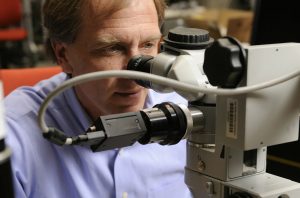Gregory D. Hager is the Mandell Bellmore Professor of Computer Science at Johns Hopkins University, and holds joint appointments in the Department of Electrical and Computer Engineering and the Department of Mechanical Engineering. Hager is known for his research on collaborative and vision-based robotics, time-series analysis of image data, and medical applications of image analysis and robotics. He has published more than 300 articles and books on these topics. Hager is the founding director of the Johns Hopkins Malone Center for Engineering in Healthcare, an interdisciplinary research center aimed at developing innovative healthcare technology and systems.

Hager’s many contributions to the field of vision-based robotics has earned him status as an IEEE Fellow. Additionally, he has been named a Fellow of the MICCAI Society, the Association of Computing Machinery (ACM), the American Institute for Medical and Biological Engineering (AIMBE), and the American Association for the Advancement of Science (AAAS).
In 2014, he was awarded a Hans Fischer Fellowship at the Technical University of Munich’s Institute of Advanced Study, where he also holds an appointment in computer science.
Hager also is a co-founder of two startups: Clear Guide Medical, whose groundbreaking platform enables doctors and technicians to perform more accurate ultrasound-guided procedures, and Ready Robotics, dedicated to making industrial robots easier to use.
Hager received his BA in mathematics and computer science (summa cum laude) at Luther College (1983), and his MS (1986) and PhD (1988) from the University of Pennsylvania. He was a Fulbright Fellow at the University of Karlsruhe, and was on the faculty of Yale University prior to joining Johns Hopkins in 1999. He has served as the deputy director of the NSF Engineering Research Center for Surgical Systems and Technology, and as chair of the Department of Computer Science from 2010-2015.
RESEARCH
 Hager’s lab, the Computational Interaction and Robotics Lab (CIRL), studies problems that involve dynamic, spatial interaction at the intersection of imaging, robotics, and human-computer interaction. As a leader in the development of algorithms for real-time computer vision and their uses for robotics, Hager’s work offers novel applications for automated surgical training, medical imaging and diagnostics, and computer-enhanced interventional medicine. CIRL is associated with the NSF Engineering Research Center for Computer-Integrated Surgical Systems and Technology (ERC-CISST) and the Laboratory for Computational Sensing and Robotics (LCSR).
Hager’s lab, the Computational Interaction and Robotics Lab (CIRL), studies problems that involve dynamic, spatial interaction at the intersection of imaging, robotics, and human-computer interaction. As a leader in the development of algorithms for real-time computer vision and their uses for robotics, Hager’s work offers novel applications for automated surgical training, medical imaging and diagnostics, and computer-enhanced interventional medicine. CIRL is associated with the NSF Engineering Research Center for Computer-Integrated Surgical Systems and Technology (ERC-CISST) and the Laboratory for Computational Sensing and Robotics (LCSR).
To learn more about Dr. Hager's research and current projects, visit the CIRL website.
PUBLICATIONS
TEACHING
600.461 - Computer Vision
600.336 - Algorithms for Sensor-Based Robotics
600.226 - Data Structures
EN.601.482 - Machine Learning: Deep Learning
SERVICE
Hager has been a member of numerous prominent review committees and panels on Artificial Intelligence (AI), including Stanford University’s inaugural “100 Year Study on Artificial Intelligence”; a roundtable on AI and foreign policy held by the National Academies of Science, Engineering, and Medicine; and a panel at the 2018 AAAS annual meeting on “Artificial Intelligence: Augmenting Not Replacing People.” He co-chaired the 2015 review of the Networking and Information Technology Research and Development Program for the President’s Council of Advisors on Science and Technology (PCAST). He is a member of the National Science Foundation’s Computer and Information Science and Engineering (CISE) advisory committee, a member of the governing board of the International Federation of Robotics Research, and is chair emeritus of the Computing Community Consortium, as well as a board member of the Computing Research Association. He has served on the editorial boards of IEEE TRO, IEEE PAMI, and IJCV.
Roundtable on AI and Foreign Policy: National Academies, Oct. 2016.
NSF Computer and Information Science and Engineering Advisory Committee (CISE AC), 2016-present
AI-100 Inaugural Study Panel Member, 2015
National Academies Panel on Mechanical Science and Engineering at the Army Research Laboratory, 2015
Co-Chair, Biannual NITRD Review Subcommittee, 2015
Steering Committee, AAAS Information, Computing, and Communication (T) Section, 2014-2016
Chair, Computing Community Consortium (CCC) Council, 2014-2016
Vice Chair, Computing Community Consortium (CCC) Council, 2013-2014
International Advisory Committee, Conference on Computer Vision in Remote Sensing, 2012-present
International Federation of Robotics Research (IFRR) Board, 2012-present
Computing Community Consortium (CCC) Council Member, 2011-present
Chair, Computer and Robot Vision Technical Committee of the IEEE Robotics and Automation Society, 1996-2000
LATEST NEWS
Hager featured on Johns Hopkins Medicine podcast
Greg Hager, Director of the Malone Center for Engineering in Healthcare, was recently featured in two episodes of the the Johns Hopkins Medicine “HealthNews Feed” podcast. Hager talks to host Elizabeth Tracy about how engineering technologies will enable older people to age in place. Listen now: December 24, 2018 – Beyond Rehab December 17, […]
Read MoreHager named AAAS Fellow
Gregory Hager is among 416 fellows elected this year to the American Association for the Advancement of Science. Founded in 1874, the AAAS recognizes scholars whose research is considered by their peers to be scientifically or socially distinguished. The distinction is unrelated to the annual list of fellows announced each spring by the American Academy […]
Read MoreHager named TUM Ambassador
Gregory Hager, Mandell Bellmore Professor in the Department of Computer Science and director of the Malone Center for Engineering in Healthcare, has been named a 2017 Technische Universität München (TUM) Ambassador. Located in Munich, Germany, TUM is one of Europe’s leading research universities. Each year, TUM honors a group of select international top-level scientists […]
Read MoreCONTACT
OFFICE HOURS
I have no scheduled office hours but you can stop by any time.
If you want a guaranteed time, contact me.
APPOINTMENTS
Tracy Marshall
tmarshall@jhu.edu
(410) 516-5821
LOCATION
Malone Hall 341
Johns Hopkins University
3400 N. Charles St
Baltimore, MD 21211
